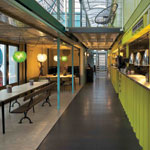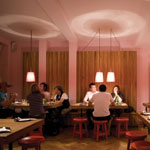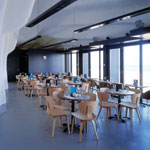How to use Facebook to grow your business
Nearly half of UK consumers interact with brands on Facebook, but this new breed of social consumer is all but immune to the hard sell. Elly Earls finds out why hospitality businesses hoping to make the most of the fast-growing Facebook phenomenon need to stop promoting and keep it social
Facebook is now used by 30 million people in the UK alone, and more and more of these people are making the most of the fast-growing social networking site to interact with brands. Indeed, 45% of all UK online consumers have now Liked a brand on Facebook, with 24% of those saying they are more likely to buy from a brand with which they have interacted. But using social media effectively is not simply about encouraging purchases through promotions and special offers; the businesses who have gained most from using Facebook have been a bit more subtle.
"The most important thing for a hospitality business to remember is that Facebook is not an advertising channel and it's not something that can just be used to promote and sell; as customers, we build up barriers to direct sales pitches or adverts and close ourselves off to them," says Barry Chandler, founder of marketing agency Interactive Hospitality.
Petra Clayton, managing director of PR and communications agency Custard Communications, agrees. "It's great for posting discounts, offers and incentives, but you don't want to do it so regularly that people stop listening to you," she notes.
Rather, Facebook should be used by businesses in the way it was originally intended - as social media. "It should be looked at as an extension of the business and an increased opportunity to continue conversations that might have been started at the venue," Chandler says. "Every business thrives on recommendations and word of mouth; it's the cheapest, most effective form of growing the business. You need to be on Facebook as a small business so that your customers will market the business for you."
However, many operators jump into social networking too quickly, posting a few pictures and menus, and hoping for the best.
"It has to be taken seriously," Clayton adds. "Businesses should treat it like any form of marketing and ask themselves before getting started what they want to achieve, who's going to manage it and whether they have the resources to put behind it."
The process of marketing has changed, too, according to Natalie Martin, founder of Kitch Media. "People are engaging with businesses all the time and on the go, so you need to be able to respond quickly."
It's therefore essential to have a member of the team keeping tabs on the business's Facebook account every day.
"It's an open dialogue where people will converse with or without you but if you don't participate, people will feel ignored or rejected," Clayton explains.
"You need to share at least once a day to demonstrate your presence and build up your profile. Moreover, people are increasingly using Facebook as a channel to ask questions and you have to be able to respond almost instantly. Of course you can't be on there all the time - but you can't leave it more than 24 hours without responding."
It's also crucial to remember that your Facebook page is an extension of your business. "You should use exactly the same language, tone and style on Facebook as you would if you were behind the bar talking to a customer," Chandler stresses. "It's a conversation and all we're trying to do is build trust and loyalty. If you change your tone, it's a different business, so remember to maintain the human aspect."
Not only is Facebook a valuable tool for engaging both new and existing customers; it's also a great way to link up with your local community, something that has always been a priority for restaurants, pubs and cafés.
"Think about how you can engage with local businesses and build a discussion with people in your area," Martin advises. "There may be events you can get involved with and social media is a great resource for finding these."
"Link up as much as possible with your suppliers," Clayton adds. "You can help each other out and build strong networks. For example, you could promote your egg supplier and they might respond by posting something about your restaurant."
The importance of this local interaction means that employing a social media or PR agency to completely take over the operation of your Facebook page is not always advisable. Images of piping hot food straight from the kitchen, videos of a parade outside the window or a mention of a couple celebrating their anniversary in the restaurant, for example, are impossible for an agency to chronicle in real-time, whereas a chef or a restaurant manager can easily post updates such as this instantly.
"It's good to have an agency to get the strategy right, integrate it with all your other marketing activities and come up with campaigns," Clayton says. "But we would always expect the client to manage the majority of their social media themselves. Often those in the hospitality business are talented at communicating with customers anyway; you just need to agree who's responsible for which areas of social media."
In the past six months, over a fifth of Brits have visited the Facebook site of a business they are loyal to, but the businesses who are converting these online visits into real-life ones are doing much more than bombarding their social media followers with offers, promotions and direct marketing.
"Customers are smart," Chandler concludes. "If we give them suggestions and subtle mentions, such as a video of a chef preparing a dish, they'll make the decision themselves. If there are too many pound signs on your Facebook page, it's a bad sign. Keep it social and don't sell."
Each page should reflect the people
"We rationalised all the social media across all the units, setting up business Facebook accounts, branding them and briefing each of the managers on Facebook etiquette, and in January and February our Likes soared really quickly," says freelance PR and communications consultant Tracey Kelly, who is in charge of the brand's social media strategy.
"But, although I set up the pages and briefed the team, I was very clear that Facebook only works if the staff at the restaurants are very embedded into the site. Each page has to reflect the people who are there, their personalities, the chat, the things that happen. You're trying to create a little world within that bar that people can buy into; it's an extension of the experience."
For Kelly, another thing that has worked really well has been interaction between the brand's different restaurants. "It's a little bit competitive between the different venues but they will all help each other along within the group," she remarks. "It's very good humoured and works well."
Building a community outside of restaurants
"We want to make sure the community that comes and eats in the restaurants has some kind of involvement with what we're doing outside of eating the food," says head of marketing Oli Ingham.
"Facebook is an ideal way to give people an insight into the background of the restaurant and maintain a conversation with them."
The chain has recently opened a restaurant space built from eight recycled shipping containers, known as the Wahaca Southbank Experiment, which is the brand's way of experimenting with new design and new dishes, and for Ingham, Facebook is playing a huge role in this.
"We're currently developing a Facebook app, which will be launched later this year, that will allow customers to vote on which of the specials at the Southbank restaurant is their favourite," he explains. "The winner will then become a special in the rest of our restaurants.
"We wanted the Wahaca Southbank Experiment to be a kind of test kitchen for us, and this Facebook app will allow our community to become recipe testers for us and give them a nice bit of involvement in the work we're doing in the kitchen."
Make it a conversation to build a bond
"Our general rule of thumb is that 80% of what we talk about should be other people," he says. "I think that's where a lot of people go wrong; people don't want their Facebook accounts cluttered up with ‘Special Offer Today!'"
Rosa's Facebook page therefore tends to feature recommendations for other local businesses as well as information on both local and Thailand-related events and news. "It helps us build a bond with our customers, but also gets them thinking if they want to go out for a Thai meal, they could go to Rosa's," Moore says.
This strategy also means that when Rosa's does post an offer or a promotion, it is generally extremely well received.
"We have just launched a cookbook, which we mentioned on Facebook in August, and one follower came in having seen it and asked for four copies," Moore adds. "Facebook instantly pays for itself."
fans want to be involved in the ethos of a brand
"My main strategy was not to be too sales-y," Freeman says. "Fans want to be involved in the whole ethos behind the brand, so we include posts about what's happening in Brighton or London at the weekend, not all of it related to food."
Indeed, as one of the venue's main selling points is its award-winning architecture, Freeman will often link to design-related articles or blog posts, as well as Liking relevant businesses such as museums and art galleries.
"We also Like and interact with our competitors; it's very amicable," she says. "It gives you a bit of kudos and shows you're willing to listen to other ideas, as well as showing you're generally nice people. If you're seen to be giving off a nice air and being friendly, people want to be part of that."
10 ways to make the most of Facebook
1 Today's consumers expect instant responses to questions and complaints so ensure you have someone receiving notifications on their smartphone or tablet, and checking your Facebook account at least once a day.
2 Aim for two posts a day, but no more. Over-posting will fill up your fans' timelines and encourage them to "Unlike" you.
3 Nominate one or two people within the business - ideally a manager, assistant manager or chef - to take control of your Facebook account. Consumers particularly love to see photos of food and learn about what goes into dishes and how they're cooked, so giving your chef some responsibility is a great option.
4 It's crucial to treat your Facebook page as a marketing channel and this means making sure it has a mix of different types of content. Offers, promotions and incentives should only be posted once in a while, but the majority of your content should aim to start a conversation. Examples of ways to do this are: videos of a chef preparing a meal, interviews with different members of staff, a link to a local event or a photo of a particularly busy night.
5 Facebook is a great way to discover exactly what your customers want before making drastic changes to your business. For example, if you want to start a new weekly event, such as a wine-tasting, ask them first through a Facebook poll.
6 Engage with your suppliers. This is something hospitality operators often forget to do, but it can be a great way to get your name out there. If you promote your asparagus supplier, for example, on your Facebook page, they will be more inclined to mention your restaurant on theirs.
7 Think about Facebook advertising. There are some marketing models that will target by postcode, are relatively inexpensive and that you can measure and track.
8 Don't forget to share any positive feedback you get on Facebook with your team. If you've had several posts about a particular night's service or a great TripAdvisor review, for example, it can create a real buzz at your business.
9 Think about employing a PR agency to help with your over-arching strategy. They can help by training your staff, integrating your Facebook page with the rest of your marketing strategy, coming up with campaign ideas and giving advice on advertising, but remember you will always need someone close to the business to post photos, videos, updates and so on.
10 Always remember that your Facebook page is an extension of your business, so talk to customers online just as you would if you were having a chat at the bar.














